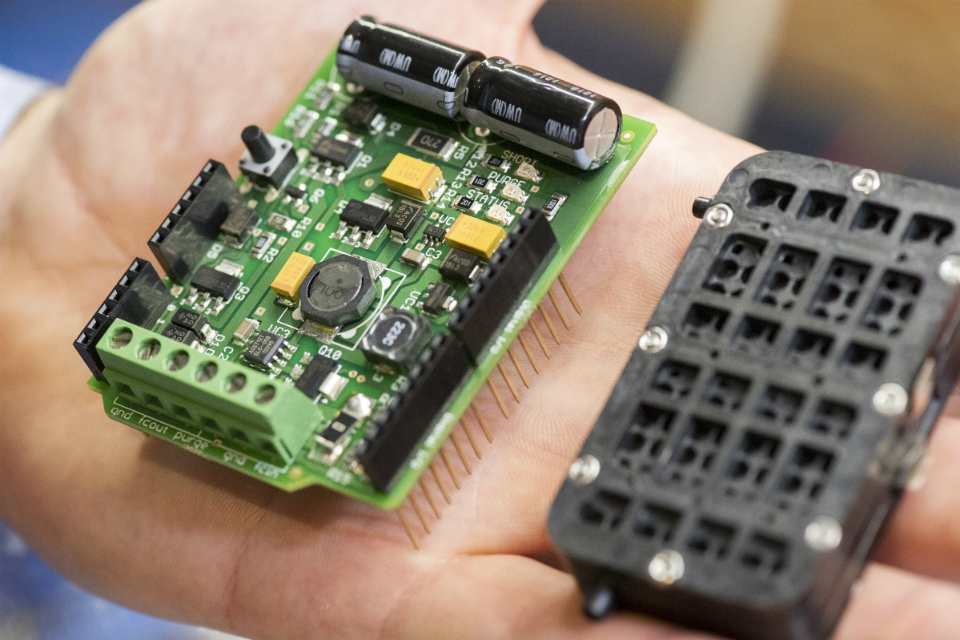Innovators lead the way in hydrogen fuel cell technology
London based company Arcola Energy develops low carbon energy products using hydrogen fuel cells with support from Innovate UK.

Arcola energy founder Dr Ben Todd
Dr Ben Todd founded the company Arcola Energy shortly after completing his PhD on solid oxide fuel cells at Cambridge University.
He became interested in developing low carbon energy solutions while volunteering for the Arcola theatre in London’s West End.
“From the beginning we’ve been interested in driving down carbon emissions,” said Ben.
Arcola Energy founder Ben Todd talks to Innovate UK about developing hydrogen fuel cell products
Those early efforts have grown into Arcola Energy, a company that develops, manufactures and sells low carbon energy solutions based on fuel cells.
“Over the years we have honed our understanding of where big energy savings come from, matching the right power generating and power-consuming technologies to make it easy for users to do the right thing. All of our work builds from that principle,” said Ben.
In 2013, the company enjoyed sales of £300,000 and Ben estimates that soon they will longer rely on external investors.
Key ingredient for success
Innovate UK played a vital role in the company’s development, explains Ben.
In 2009, Arcola was awarded a grant of £27,000 to develop a portable lighting unit that combined a 150W fuel cell with high efficiency LED technology.
Fuel cells provide energy as a result of converting hydrogen and oxygen in to water. Because the cells don’t use fossil fuels they produce no direct emissions.
When combined with the right source of hydrogen, the technology can meet the UK government’s target of reducing greenhouse gas emissions by 80% by 2050.
But Arcola recognises that creating applications for fuel cells that are cost effective enough to be attractive to end users is no easy task.
“We’re trying to develop a technology platform where people can come and say ‘I have a problem. How can I use fuel cells?’ so let’s work with you to design a product you can use,” said Ben.
The Dell computer of fuel cells
The company now has ambitions to become the Dell Computer of fuel cells – a systems integrator.
Following a second grant of £25,000 from Innovate UK, Arcola was able to develop a more powerful system called the Hylight 500.
It is now integrating fuel cells into lightweight electric vehicles and working with two of the world-leading companies in this space, Microcab and Riversimple, both of which are UK-based.
“Aside from the very significant CO2 savings and market potential, there is something wonderfully tangible about cars - when we try to explain what we do to the lay-person, it all suddenly becomes clear when we say - see that car on the road, we put the fuel cell in it which powers the electric motor,” said Ben.
The company is also using a grant of £199,000 from Innovate UK to build on its Hylight technology platform. Working in partnership with industrial gas supplier BOC, and a small hydrogen technology company called Re Hydrogen, Arcola Energy aims to bring down the cost of fuel cell energy systems in the market.
Innovate UK is contributing £443,000 of the total project cost of £886,000 of the three-year project.

Arcola fuel energy cell
New markets
Arcola Energy is now working with a wide range of clients in the green energy and education sector to create a diverse cash-source model for the business.
One key project involves working on green energy solutions in partnership with Re Hydrogen, Juwi Renewables, Revolve Technologies, flexitricity and Rutland Management. The project aims to develop a viable solar-hydrogen energy system by providing constant green electricity and heat to the Dunsfold Park business park.
Arcola Energy also provides educational services for schools and delivers innovative and inspirational workshops using renewable energy technologies to design, build, and explore the possibilities of a low-carbon future.
Other recent projects include the formation of a UK joint venture company with Horizon Fuel Cell Technologies in Singapore, to manufacture fuel cell stacks in the UK for automotive customers.
With such a diverse client base spanning a range of sectors, Arcola looks set to expand business even further in future.
“We wouldn’t be here without Innovate UK. You can run a commercial business and generate a bit of surplus cash but it’s not enough to fund the kind of research and development we need to do,” said Ben.
But Ben says that Arcola’s success is not only down to cash.
“Cash is a simple idea, but collaborative R&D is what I really like. Out of Innovate UK we’ve got some really strong commercial relationships. It de-risks building a new partnership,” said Ben.
Updates to this page
-
First published.